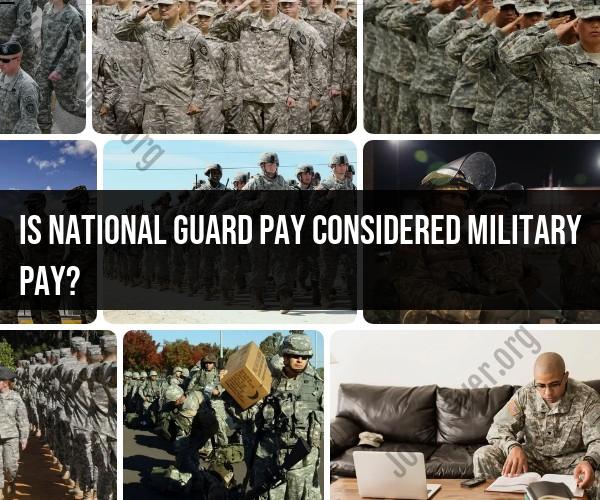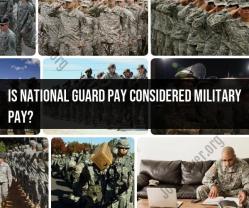Is National Guard pay considered military pay?
Yes, National Guard pay is considered military pay. The National Guard is a reserve component of the United States military, and its members are subject to the same basic pay and compensation structure as active-duty military personnel. National Guard members receive military pay for their service, which includes a base pay, allowances for housing and subsistence (if eligible), and other special pays or bonuses as applicable.
The pay for National Guard members is determined by their rank, time in service, and other factors, just like active-duty military personnel. National Guard members also receive compensation for their training periods and any active-duty deployments or missions they participate in.
In addition to their military pay, National Guard members may be eligible for benefits such as healthcare coverage, retirement benefits, education benefits (such as the Montgomery GI Bill), and more.
It's important to note that the National Guard serves a dual role, where its members can be called upon for both state and federal missions. When activated for federal service, such as deployments overseas or in response to national emergencies, National Guard members receive the same military pay and benefits as active-duty military personnel serving in similar roles. When activated for state service, their pay and benefits may be determined by state authorities.
Overall, National Guard pay is an integral part of the military compensation system and is considered military pay in the United States.
National Guard Pay and Military Compensation: What You Need to Know
National Guard members are compensated for their service in a variety of ways, including drill pay, annual training pay, and deployment pay. They are also eligible for a number of military benefits, such as health insurance, retirement pay, and educational benefits.
Drill pay is paid to National Guard members for each drill weekend that they attend. Drill pay is based on the member's rank and pay grade. For example, a private first class (E-2) earns $42.40 per drill day.
Annual training pay is paid to National Guard members for the two-week annual training period that they attend each year. Annual training pay is also based on the member's rank and pay grade. For example, a private first class (E-2) earns $379.20 per week for annual training.
Deployment pay is paid to National Guard members who are deployed to active duty. Deployment pay is based on the member's rank, pay grade, and deployment location. For example, a private first class (E-2) deployed to a combat zone earns $3,500 per month.
In addition to drill pay, annual training pay, and deployment pay, National Guard members are also eligible for a number of military benefits, such as:
- Health insurance: National Guard members are eligible for TRICARE, the military health insurance system. TRICARE provides health insurance coverage to National Guard members and their families.
- Retirement pay: National Guard members who serve for at least 20 years are eligible for retirement pay. Retirement pay is based on the member's rank, pay grade, and years of service.
- Educational benefits: National Guard members are eligible for a number of educational benefits, such as the GI Bill. The GI Bill provides financial assistance to veterans and National Guard members to help them pay for college.
Service-Related Income: National Guard Pay and Its Status
National Guard pay is considered to be service-related income. This means that it is exempt from federal income tax up to a certain amount. The amount of service-related income that is exempt from federal income tax varies depending on the member's rank and pay grade.
Payroll for Guardsmen: A Look at National Guard Compensation
National Guard members are paid through the Defense Finance and Accounting Service (DFAS). DFAS is responsible for processing the payroll for all military members, including National Guard members.
National Guard members are typically paid twice a month, on the 1st and 15th of the month. However, the exact date that a National Guard member is paid may vary depending on the member's unit and DFAS processing.
National Guard members can view their pay statements and tax information online through the DFAS website.
Conclusion
National Guard members are compensated for their service in a variety of ways, including drill pay, annual training pay, and deployment pay. They are also eligible for a number of military benefits, such as health insurance, retirement pay, and educational benefits.
National Guard pay is considered to be service-related income and is exempt from federal income tax up to a certain amount. National Guard members are paid through DFAS, which is responsible for processing the payroll for all military members.


